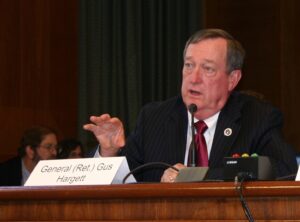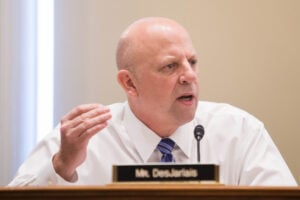The Tennessean: SecArmy Nominee Green’s Outsider Status Makes Him Vulnerable
Posted on

Mark Green in Army service.
WASHINGTON: Who is Mark Green, really? Donald Trump‘s new nominee for Army Secretary has much more experience in uniform and in government than Trump’s first try, West Point-educated billionaire Vincent Viola. Even some Democrats I talked with noted his “impressive resume.” But that doesn’t mean Green’s confirmation will be easy.
Yes, Green knows the Army. He knows Tennessee. He knows the Tea Party. But he doesn’t know much about Washington, and Washington doesn’t know him. That’s allowed opponents to frame the debate about Green almost entirely in terms of his conservatism on LGBT rights and immigration. Sure, those are significant questions for the Army, which is still struggling with issues ranging from women in combat to sexual assault, and whose last service secretary, Eric Fanning, was the first openly gay person to hold the job. But there are lots of other aspects of the Army Secretary’s portfolio for which Green has impressive and uncontroversial credentials.

Maj. Gen Gus Hargett
“I really know Mark through the Tennessee legislature,” said Gus Hargett, retired two-star general, former Adjutant-General of the Tennessee Guard, and outgoing president of the powerful National Guard Association of the US. “(He’s) very personable, very cordial, and very willing to listen.
“What I saw in Mark Green was willingness to support soldiers no matter what component they were (i.e. regular active duty, National Guard, or reserve). Any bills (on) veterans’ issues… I always saw Mark involved in those,” Hargett told me. “He has been an empathetic supporter of the Tennessee Guard (and) has been a great supporter of the veterans’ organizations down there.”
Of more than a dozen sources I asked about Mark Green — on the Hill and in the Army community — just two felt they knew enough about him to comment, and both knew him from Tennessee. One was Hargett. The other was the only Tennessee Republican on the House Armed Services Committee, Rep. Scott DesJarlais, an early Trump supporter who (unsurprisingly) lauded Green’s record.
“Dr. Green’s exemplary service as an Army soldier, veteran of recent military conflicts, and also physician with successful private sector experience, makes him a great nominee for Army Secretary, tasked with repairing combat readiness,” DesJarlais said in a statement. “I look forward to working with my fellow Tennessean to protect our troops and national security.”

Rep. Scott DesJarlais
It’s no wonder Green’s well known in Tennessee, where he has been a rising star of the Tea Party. Green was first elected to the state legislature just five years ago, in 2012, but he was already preparing for a gubernatorial run when Trump tapped him for federal office.
Before Green entered politics, he served 20 years in the US Army — first as an infantry officer and then as a physician: The unusual shift in specialties, Green says, was inspired by the surgeon who saved his father’s life. A Ranger School graduate who deployed to the Middle East three times as a flight surgeon in the famed 160th Special Operations Aviation Regiment (SOAR), Green first came to public notice as the medical officer assigned to monitor Saddam Hussein the night the Iraqi dictator was captured. Green later self-published a memoir focused on their conversation.
That’s considerably more military experience than the few years racked up by fellow West Pointer Vincent Viola, Trump’s previous nominee for Army Secretary, or for that matter by Army Reserve officer Philip Bilden, nominated for Navy Secretary. Both men were outsider billionaires who faced skepticism over their inexperience and ultimately withdrew, saying their financial affairs were simply too complex to disentangle to Congress’s satisfaction. Since this double debacle, Trump has picked Pentagon nominees with a greater wealth of experience and less literal wealth. With his track record in the Army and the Tennessee legislature, Green fits right in with this new crop of candidates — except for his public positions on LGBT rights and immigration, which leave him unusually vulnerable to attacks from the left.
“All of these groups should give Mark a chance, because I think they will find him open and receptive to their ideas,” Hargett told me,” (and) what I would say to Mark (is) don’t come with preconceived notions. Come with an open mind and be willing to listen.”
Subscribe to our newsletter
Promotions, new products and sales. Directly to your inbox.
